
Managing Deepwater Horizon Data for the Future

In the wake of the Deepwater Horizon (DWH) oil spill, millions of dollars have been spent by federal agencies, private industry, and non-governmental organizations on activities from early response to long-term restoration. While some activities, such as the Natural Resource Damage Assessment, had very clear data management requirements, other activities have not had the same stringent guidelines. This has led to a broad data management landscape for Gulf of Mexico data. To foster collaboration amongst the partners and identify standards to guide long term data management for DWH data, NOAA's Office of Response and Restoration (ORR), in partnership with NOAA's National Marine Fisheries Service Restoration Center (NMFS RC) and NOAA's National Centers for Environmental Information (NCEI) hosted the DWH Long Term Data Management Coordination Workshop from June 7-8, 2017 in Mobile, Alabama. Representatives from the Gulf of Mexico Initiative Information & Data Cooperative (GRIIDC), Gulf of Mexico Coastal Ocean Observing System (GCOOS), Gulf of Mexico Alliance (GOMA), National Academies of Science, Engineering and Medicine, The Water Institute of the Gulf, and multiple state and federal agencies participated in the two day meeting.
“This workshop brought together major partners in the Gulf of Mexico data management community,” said Dr. Jim Gibeaut, GRIIDC Director and member of the organizing committee. “Continuing collaborations through workshops such as this will help ensure a data legacy from DWH-related research, response, restoration and monitoring activities.”
The meeting was facilitated by Dr. Nancy Kinner, Director of University of New Hampshire’s Coastal Response Research Center. Dr. Kinner kicked off the meeting with the analogy that data standards are like toothbrushes — everyone wants one, but no one wants to use someone else’s. Day one plenary sessions provided background information on the current state of DWH data management and data standards. Eight data management systems that host data related to the DWH event were presented to participants. In the afternoon, breakout groups allowed participants to discuss data management challenges with individuals with similar organizational responsibilities for data.
Day two started with a plenary session sponsored by the Gulf of Mexico Research Initiative (GoMRI) featuring Mr. Larry Langebrake from Connectsix LLC titled, “Big Picture Vision – An Outsider Perspective – Managing Big Data.” He asked participants to consider the question “of the hundreds (or thousands) of things we could do, what should we do?” Using a framework from the business world, Mr. Langebrake encouraged the use of the value creation model to identify data customers and determine their needs to make data products that can inspire new insights. The plenary was followed by breakout sessions focused on solutions to address issues for 6 areas: data interoperability, ease of discovery/searchability, data access, data synthesis, data usability, and metadata/data documentation. In the afternoon, repositories, including GRIIDC, presented system data workflows to determine areas of overlap and interoperability. The resulting workshop report is expected in fall 2017.